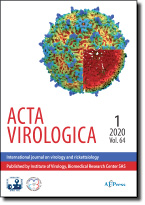Acta Virologica Vol.58, No.3 p.282-286, 2014
|
| Title: Acetylation changes at lysine 5 of histone H4 associated with lytic gene promoters during reactivation of Kaposiʹs sarcoma-associated herpesvirus |
| Author: L. R. HWANG, S. CHA, J. E. JONG, J. H. JANG, T. SEO |
|
Abstract: Kaposiʹs sarcoma-associated herpesvirus (KSHV) is a pathogenic agent of Kaposi’s sarcoma, primary effusion lymphoma and multicentric Castleman's disease in humans. Similarly to other gammaherpesviruses such as Epstein-Barr virus (EBV) and herpesvirus saimiri (HVS), KSHV displays two alternative life cycles, latent and lytic one. The transactivation from latency to the lytic phase is the result of transcriptional changes in the KSHV genome caused by the replication and transcriptional activator (RTA). During KSHV reactivation, epigenetic modifications of histone protein on the viral genome occur, which regulate the transcriptional activation of a number of lytic genes. The reactivation of EBV from latency to lytic cycle, induced by an immediate-early Zta protein, was shown to be accompanied by acetylation of specific lysines in histone H4. Accordingly, we hypothesized that the RTA-induced transactivation of KSHV could also be accompanied by histone acetylation. To validate this hypothesis, we assayed alterations of acetyl-histone H4-lysine 5 (acH4K5) during the RTA-mediated KSHV reactivation. While the modified histone protein in a total cell lysate was not distinguished between control and RTA-expressed cells, upregulated acH4K5 was detected on several lytic gene promoter regions during KSHV reactivation. Our results clearly indicate that this epigenetic change is related to transcription of genes expressed in the lytic cycle of KSHV.
|
|
| Keywords: Kaposi΄s sarcoma-associated herpesvirus; lytic reactivation; replication and transcription activator; histone H4; lysine acetylation |
|
|
|
| Year: 2014, Volume: 58, Issue: 3 |
Page From: 282, Page To: 286 |
doi:10.4149/av_2014_03_282
|
|
 download file download file |
|
|
|
|
 download file
download file
